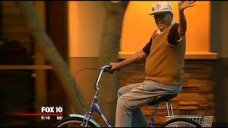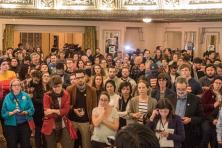I’m going to burn my driver’s license when I turn 75. Maybe sooner. I’d like to do it at the offices of Koch Enterprises, if I can get a ride home.
You may think this is a choice to sacrifice some freedom. But it’s the opposite: a declaration of independence from the tyranny of oil.
So I have twenty years – plenty of time – to build the family and community ties and the physical infrastructure for a car-free life. Having made this pledge, I’m much more committed to mixed-use development, transit investment, and babysitting my prospective grandkids so someone will feel obliged to give me rides when I need them. I’ll be safer, and so will everyone else, when I’m not travelling a mile a minute in 2-ton projectile when I can barely see. If there’s a minimum age for a driver’s license, why not a maximum?
Contrary to everything we fear about what happens when older folks give up driving, I’ll be freer. I won’t be physically strapped to a small power plant in rapid motion among many. I won’t have to pay an arm and a leg to buy, insure, and maintain the beast. I won’t have to sit in traffic, spewing carbon and going nowhere, while the bikers whiz past me. I won’t have to pay through the nose to park it… that’s right, just to temporarily get out of the damned thing.
And best of all, I will not have to pull up to the gas pump and open my wallet so the Koch Brothers and Rex Tillerson and the US Chamber of Commerce can vacuum it clean. I won’t have to take my little share of my community’s wealth and shoot it to the tippy-top of the economic pyramid. I won’t have my money used to pay for false science and political campaigns to elect climate deniers and marketing strategies that equate fossil fuel extraction with happiness and health.
I grew up in LA in the sixties and seventies. Cars were freedom. Cars were status. Cars were sex. So I get why we like (I need) cars: Madison Ave. spent jillions cementing a linear relationship between our self-esteem and the horsepower under our hoods. And the oilgarchs worked hard to make sure we radically underinvested in transit and built our communities around cars, so that even if we could shake our egos free, we couldn’t get anywhere without strengthening their hold on wealth and power. Even now, cops are carpeting downtown LA with jaywalking tickets, lest the humans, who are resettling downtown Autotopia like an invasive species, impinge on car habitat.
But the gig’s up now, or it certainly will be by the time I’m 75. Transit and ridesharing and bike infrastructure and healthy mixed-use local communities are delivering better mobility service at lower cost. Alan Durning, who wrote “The Year of Living Carlessly” just seven years ago, told me recently “I couldn’t write that now. People would say, ‘So what?’”
Even where cars are still necessary, they’re more and more a necessary evil, not a gift. And if you need one after seventy-five, when your vision sucks and your reflexes are slow and you need a bathroom all the time, well, that just can’t be freedom.
Maybe one can only say this from a bubble like Seattle. But I think this transition is gaining momentum almost everywhere. We’ve seen enough glimpses of better ideas to confirm what should be obvious: lashing ourselves to a big steel crate impelled by oil, the payments for which are used to trample democracy and brutalize our grandkids, can’t be the best – the smartest, the healthiest, the most elegant – way to get our decreasingly skinny asses from point A to point B. And besides, point A would rock much harder if we got out of the damned car more. As Amory Lovins once quipped, “Personal mobility is a symptom….of being in the wrong place.”
OK, it is possible that I’m trying to turn the tables on the relationship between cars and freedom because I’m so desperately afraid of what we’re doing to the climate. It’s conceivable that I’m making this all up because I’d like my grandkids to, you know, survive. I’m ok with that.
At least I’ve convinced myself. When I have to get in a car in Seattle, I feel like a sucker. It’s like I’m in a video game and I can hear this nasty honky-buzzy noise that means “You lost, loser!” Whereas my bike ride to and from work is a consistently delightful part of my day. “Ding, ding, ding!”
When I give up that driver’s license, I’ll just be burning a one-way ticket to Hell. I only wish – given how much we keep throwing down a rathole to pave the road there – it were refundable.
Thanks to dear friend-of-all-good-things Martha Wycoff for the idea of a maximum age for a driver’s license.
* Confession: I’m already hedging. I just leased a Leaf! I can’t wait to pull into a gas station, clean my windshield, inflate my tires, and leave.
Originally posted at GRIP on Climate




